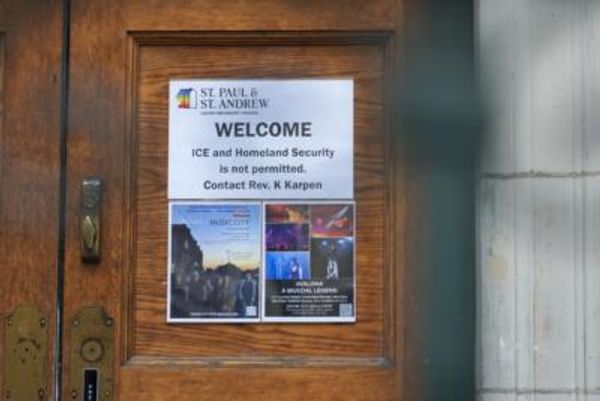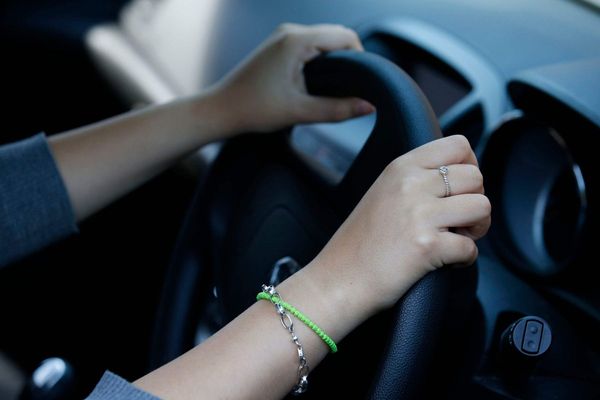PHILADELPHIA — In the bustling corridor outside Northeast High School’s gymnasium, a 15-year-old told one of Philadelphia’s best-known COVID-19 vaccination advocates he had doubts about what she was promoting.
“I don’t know,” the boy said. “I don’t know about the vaccine.”
His grandfather didn’t want him to get it, he told Ala Stanford, pediatric surgeon and founder of the Black Doctors COVID-19 Consortium, dedicated to ensuring equity in the vaccination effort. If he did, he said, he might have his video games taken away.
“It’s up to you whether you get it or not,” Stanford replied, “but I will listen to you.”
There were several interactions like that Wednesday morning, at the beginning of a two-day vaccination clinic hosted at the school by Stanford and the Federal Emergency Management Agency, who have been visiting city schools and will continue to do so through much of February. About 54% of the city’s 12- to 17-year-olds and 47% of 5- to 11-year-olds are vaccinated, and that’s not nearly enough, Stanford said.
In Philadelphia, anyone 11 or older may be vaccinated with or without parental consent, according to a health department spokesperson. The city School District has its own consent policy, Stanford said, requiring parental permission for shots administered to children in eighth grade or below, regardless of age. Allowing teens old enough to understand the need for vaccination to make their own decision, she said.
Students could check out of their lunch period and get the shots immediately. Staff hoped to vaccinate between 200 to 300 by the end of Thursday.
It was also a chance to ask questions of Stanford, who was treated as a visiting celebrity by staff and students.
“We were so glad you were coming here, really,” said Amy Leaness, a school nurse who described months of struggle managing COVID-19 at the school.
Keeping track of student vaccinations, which determine whether a child needs to quarantine after a COVID-19 exposure, has been a logistical nightmare. Efforts to keep the virus out of the school hit a wall shortly after the holidays, when as many as 10 to 20 students a day were testing positive for COVID-19. Things have gotten better since.
Yet the vaccine refusals continue.
“We’ve had kids come in and say their parents aren’t allowing them to get it,” said Margaret Beyer, another nurse.
Stanford said repeatedly Wednesday that students in ninth grade and up don’t need parental permission to get vaccinated. Whether it’s to protect older family members who are more vulnerable to the worst effects of the virus, or to stay involved in youth sports, she kept the focus on the benefits of getting vaccinated.
After a morning assembly that introduced Stanford and the rules of the clinic to students, student Janiah Burris told Stanford she had gotten her second shot two months ago but was reluctant to get a booster when she became eligible. The 16-year-old later said she was worried it would make her sick. But instead of quizzing her on her motives, the doctor initially validated Burris’ concerns, telling her it was possible by the time she could get a booster in a few months COVID-19 might be less prevalent. If it wasn’t, though, the booster would provide a big benefit.
Stanford described her own experience with a COVID-19 infection, told the girl how sick she got, and said being able to keep attending school and her job at Honeygrow would be easier if she was boosted.
“You can even reach out to me in three months,” Stanford said. “Once Easter happens, think about reaching out to me.”
Burris said later that the conversation clarified why boosters are helpful, but she still wasn’t sure how much the shots mattered.
“I’m not sure it’s actually protecting me,” she said.
Kaher Abuali, 16, said vaccination is not a big topic in his group.
“They think corona won’t affect us because we’re young,” he said.
Abuali got his first dose Wednesday after being convinced by a friend and distant relative, Ayham Muhanna, 15. All morning, Muhanna worked his phone, calling friends and family within the school’s Palestinian community to persuade them to get their shots.
“He motivated me, bro,” said Abuali, slapping hands with Muhanna. “It was all him.”
Muhanna didn’t have plans to get his booster shot Wednesday, and didn’t start the day intending to rally classmates around vaccination, but a presentation from Stanford at the beginning of the day inspired him.
“Maybe I’ll get my vaccine today,” he described his thinking, “and maybe I’ll bring my friends along with me.”
Many have young children in their families, he said, something he used to encourage them to go to the clinic.
Later, Muhanna strode across Northeast High School’s gymnasium toward a table where federal medical workers signed students up for vaccination.
“I brought another family member!” he shouted.
In a school where less than half of the roughly 3,200 students are vaccinated, a new proselytizer for vaccination was more than welcome.
“He was the first to call me up right here,” said the new kid Muhanna brought to the clinic, Ahmad Abuali, Kaher’s cousin.
As the morning passed, the boy whose grandfather didn’t want him vaccinated didn’t reappear. Stanford said she wished she had more time to talk to him. During their brief interaction, she emphasized that getting vaccinated was a confidential medical decision the boy was old enough to make.
“I don’t have to tell him,” she told the boy, referring to his grandfather. “You don’t have to tell him.”
The boy looked away from her as she spoke, considering. Then a distraction from security staff broke their conversation, and without a word the boy walked away, vanishing into the crush of students bustling through the hallway.







